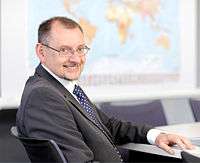Andy Harter
Andrew Charles Harter CBE DL FREng CEng FIET FBCS CITP FRSA (born 1961 in Yorkshire, England) is a British computer scientist, best known as the founder and CEO of RealVNC.
Andy Harter | |
|---|---|
 | |
| Born | Andrew Charles Harter 5 April 1961 Yorkshire, England |
| Nationality | British |
| Education | Queen Elizabeth Grammar School, Wakefield |
| Alma mater | University of Cambridge (MA PhD) |
| Known for | Virtual Network Computing |
| Awards | Turing Lecture (2018) Faraday Medal (2016) MacRobert Award (2013) Silver Medal (2010) |
| Scientific career | |
| Fields | Computer Science Software Engineering |
| Institutions | University of Cambridge RealVNC |
| Thesis | Three-Dimensional Integrated Circuit Layout (1990) |
| Doctoral advisor | Andy Hopper |
Education and early life
Born in Yorkshire in 1961, Harter attended the Queen Elizabeth Grammar School, Wakefield. He went on to the University of Cambridge, where he studied Mathematics and Computer Science as an undergraduate student of Fitzwilliam College, Cambridge[1] and a postgraduate student of Corpus Christi College, Cambridge. His doctoral thesis,[2] supervised by Andy Hopper, was judged the best UK Computer Science dissertation of 1990.[2]
Career and research
Harter is probably best known for Virtual Network Computing, (VNC) a ubiquitous remote access technology he developed in the mid 90s. He founded RealVNC in 2002 and remains its Chief executive. In recent years he has worked on embedding the technology in Google and Intel products.[1] Under his leadership, in 2013 the company received its third Queen's Awards for Enterprise[3] in three years[4] and he was named the Cambridge Businessman of the Year in 2011.[5] Harter was elected a Fellow of St Edmund's College, Cambridge in 2001[6] and appointed a Visiting Fellow at the University of Cambridge Computer Laboratory in 2002.
Awards and honours
In 2002 he was elected a Fellow of the Institution of Engineering and Technology (FIET), where he served as a trustee between 2014 and 2017.[7] In 2010 he was awarded the Silver Medal of the Royal Academy of Engineering[8] in recognition of an outstanding and sustained contribution to software engineering and commercialisation and in 2013 he led the team that won the Academy's prestigious MacRobert Award.[9] In 2011 he was elected a Fellow of the Royal Academy of Engineering (FREng),[10] where he served as a trustee between 2013 and 2016.[11] In 2014 he was appointed Chair of the Cambridge Network[12] and in 2015 he was awarded an Honorary Doctor of Science degree from Anglia Ruskin University[13] and also became a trustee of The Centre for Computing History. In 2016 he was awarded the Faraday Medal, the most prestigious award of the IET.[14]
Harter was appointed Commander of the Order of the British Empire (CBE) in the 2017 Birthday Honours for services to engineering.[15] He delivered the Turing Lecture in February 2018, and in March 2018 became the High Sheriff of Cambridgeshire. In 2019, he was appointed a Deputy Lieutenant of Cambridgeshire.[16]
References
- "Optima, Issue 17". Fitzwilliam College, Cambridge. 2011. Archived from the original on 14 May 2011. Retrieved 30 April 2011.
- Harter, Andrew Charles (1990). Three-dimensional integrated circuit layout. lib.cam.ac.uk (PhD thesis). Cambridge University Press. doi:10.1017/CBO9780511666384. ISBN 9780511666384. OCLC 321015651. EThOS uk.bl.ethos.335724.
- "The Queen's Awards for Enterprise"
- "RealVNC wins third Queen’s Award in three years"
- "Cambridge Business Excellence Awards 2011" Archived 28 October 2011 at the Wayback Machine>
- "Fellows of the Colleges"
- "Trustee Board - IET". Archived from the original on 30 September 2018. Retrieved 18 May 2018.
- "Top Cambridge engineer wins Academy Silver Medal". Archived from the original on 14 December 2011. Retrieved 13 January 2011.
- "Software company RealVNC wins UK's premier engineering prize"
- "Academy celebrates a new President and 59 new Fellows". Archived from the original on 2 April 2012. Retrieved 27 October 2011.
- "Trustee Board – Royal Academy of Engineering"
- "Cambridge Network welcomes Andy Harter as new Chair"
- "Internationally renowned engineer is made a Doctor of Science"
- ""Dr Andy Harter awarded the prestigious IET Faraday Medal". Archived from the original on 30 September 2018. Retrieved 20 September 2016.
- "No. 61962". The London Gazette (Supplement). 17 June 2017. p. B8.
- Lord-Lieutenant of Cambridgeshire appoints new deputies